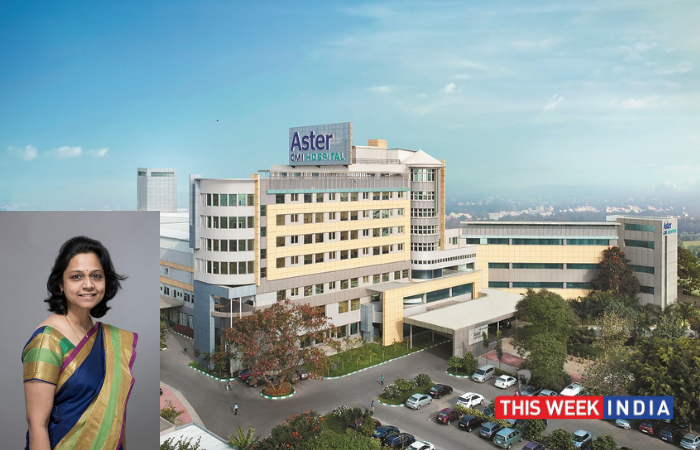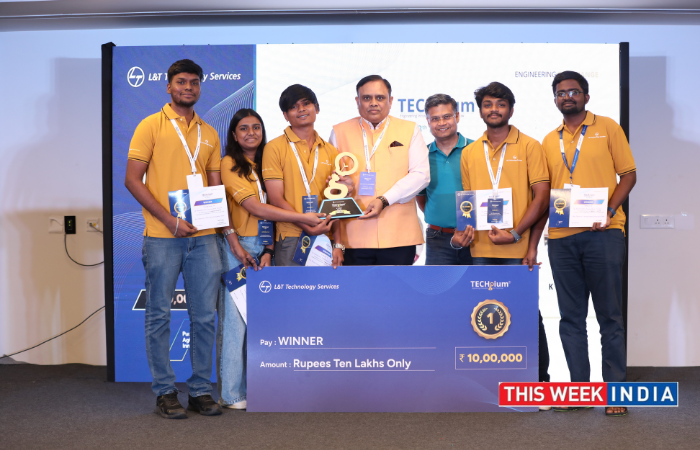Rare case of spontaneous pneumothorax successfully treated
The team of doctors from the neonatal unit at Aster CMI Hospital performed a timely procedure and saved the life of a newborn, Raju (name changed) from Chikkaballapur, who developed spontaneous pneumothorax a day after he was born. Raju, who was a healthy term baby born in a peripheral setup, who did not have any complications during the delivery process or need any resuscitation after birth, developed sudden breathing difficulty and cyanosis i.e., his skin and lips turned blue due to lack of oxygen. His Chest X-ray showed that he developed a spontaneous pneumothorax which is collection of air in the pleural cavity that causes the lung to collapse. The doctors tried to drain the air with a needle but it continued to re-accumulate despite drainage. He was then referred to Aster CMI Hospital. A team of neonatal doctors led by Dr. Parimala V. Thirumalesh and neonatologists Dr. Sreekanth Reddy and Dr. Abhinay performed the timely procedure that saved his life.
Spontaneous pneumothorax is a life-threatening condition and needs immediate medical attention. Delaying treatment can cause severe damage to the lungs which can lead to death. In most cases, Spontaneous Pneumothorax shows severe symptoms such as chest pain, shortness of breath, cyanosis, rapid heart rate, nasal flaring, and cardiorespiratory arrest.
Commenting on the condition of Raju, Dr. Parimala V Thirumalesh, Senior Consultant – Neonatology & Paediatrics at Aster CMI Hospital said, “Neonatal procedures are both delicate and often risky which involves exemplary skills and high-end equipment to be successful, sometimes it also needs a multidisciplinary team approach. In a tertiary center such as Aster CMI, different treatment options are easy to provide due to the availability of the necessary skill set, manpower and equipment. Spontaneous pneumothorax in newborns occurs rarely with an incidence of 2.5 per 1000 births and immediate treatment should be given to relieve the pressure created by air accumulation on the normal lung to help it to re-expand and continue breathing function, which if not done quickly could turn lethal. To remove the excess air, Raju underwent immediate needle aspiration, a diagnostic procedure that also buys time from the imminent crash while preparing to insert a small flexible chest tube between the ribs into the air-filled space that is pressing on the collapsed lung. The baby was connected to a breathing machine (mechanical ventilator) till his lungs were ready to take over his breathing. He was then evaluated for infection and other causes of respiratory distress and treated with supportive measures. CT scan was done to rule out if he was born with any lung problems like cysts which can rupture and cause his problem in which case it can recur later in life but the scan was normal. The treatment went well and Raju recovered from the surgery.”
Thanking the doctors, Raju’s parents said, “We were thrilled when Raju was born but it was short-lived happiness when he suddenly started having breathing difficulties and his skin turned blue. The doctors at Aster CMI hospital carefully evaluated our baby’s case and saved him from the severe condition. We are thankful to the doctors at Aster CMI as they have given rebirth to our baby.”
Post the procedure, Raju recovered quickly and his condition improved significantly. He was ventilated for five days; his chest drain was also removed on the same day as the pneumothorax had sealed and he was taken off oxygen on the sixth day and was discharged from the hospital with no complications and went back to his hometown after seven days.









